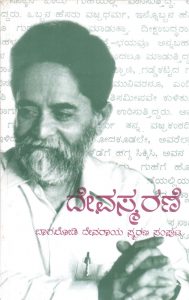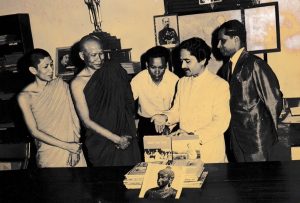(ಸಹಪಾಠಿ ಮಿತ್ರರು ಕಂಡ ಬಾಗಲೋಡಿ – ೬)
(ಬಾಗಲೋಡಿ ದೇವರಾಯರ ಸ್ಮರಣ ಸಂಪುಟ – ‘ದೇವಸ್ಮರಣೆ’ ೨೦೦೩ರಲ್ಲಿ ಅತ್ರಿ ಬುಕ್ ಸೆಂಟರ್ ಪ್ರಕಟಿಸಿದ ಪುಸ್ತಕದ ಯಥಾ ವಿದ್ಯುನ್ಮಾನ ಪ್ರತಿ ೨೦೧೭. ಸಂಪಾದಕ – ಜಿ.ಟಿ. ನಾರಾಯಣ ರಾವ್)
(ಭಾಗ ೧೧)
– V. Gurumurti
 Bagalodi Deva Rao was a genius. In his writings, words fell in place with effortless ease, conveying profound thoughts often laced with humour in pithy phrases. He was a mighty intellect with a wide spectrum of intersts. His heart was equally expansive and he had only good words of appreciation and encouragement to all.
Bagalodi Deva Rao was a genius. In his writings, words fell in place with effortless ease, conveying profound thoughts often laced with humour in pithy phrases. He was a mighty intellect with a wide spectrum of intersts. His heart was equally expansive and he had only good words of appreciation and encouragement to all.
As an admiring classmate of Bagalodi in the first honours I would like to recall one event of his college days.
One `Hervy’ whom the English poet Alexander Pope did not particularly like, used to take asses’ milk every day, for its medicinal value. Pope ridiculed him for this habit in one of his satirical pieces – I forget the actual lines. In answer to an examination question in English literature, annotation, Deva Rao quipped towards the end of his answer “POOR HERV’S VALETUDINARIAN DIET TOO IS MADE A DEBIT.” The additional relevant point to remeber is, he took this examination, rushing to the hall, a couple of minutes late, straight from his French diploma classes at the University (of Madras) building some 18 miles away (from Tambaram.)
Bagalodi had no airs, was honest and straightforward. This integrity of his did not endear him to his political bosses in Delhi during his titin in the Indian Forreign Service. From GTN I heard that in Kannada also, he was a writer of repute. He was all in all a great man adorned whatever he touched.
 It is beyond me to give even an outward glimpse of Deva Rao’s multidimensional personality resting on love and compassion. Let me surrender to Shakespeare (Hamlet) : “What a piece of work is a man! How noble in reason! how infinite in faculties! in form and moving, how express and admirable! in action how like an angel! in apprehension, how like a god! The beauty of the world! the paragon of animals!”
It is beyond me to give even an outward glimpse of Deva Rao’s multidimensional personality resting on love and compassion. Let me surrender to Shakespeare (Hamlet) : “What a piece of work is a man! How noble in reason! how infinite in faculties! in form and moving, how express and admirable! in action how like an angel! in apprehension, how like a god! The beauty of the world! the paragon of animals!”
And when I think of Deva Rao, his charisma, compassion and transparency, I realize how true was Shakespeare in his “emotion recollected in tranquillity” –
Who will believe my verse in time to come,
If it were fill’d with your most high deserts?
Though yet, heaven knows, it is but as a tomb
Which hides your life and shows not half your parts.
If I could write the beauty of your eyes
And in fresh numbers number all your graces,
The age to come would say `This poet lies;
Such heavenly touches ne’er touch’d earthly faces.’
So should my papers, yellowed with their age,
Be scorn’d, like old men of less truth than tongue;
And your true rights be term’d a poet’s rage,
And stretched metre of an antique song.
But were some child of yours alive that time,
You should live twice – in it, and in my rhyme.
(ಮುಂದುವರಿಯಲಿದೆ)
Giant of a personality
Reading about Bagalodi what his classmates and peers–more or less his own age–have to say of him, apart from the genius of the man they all are portraying,one gets also a profound sense of what a fine and remarkable group of young men they must all have been! And at what age? between the ages of 18 and say 20 or 21? Do we get to see so many such in one place these days? Or am I just being carried away by their charming accounts?